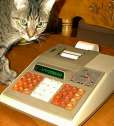Hanimex SPC 1090
| Datasheet legend
Ab/c:
Fractions calculation
AC: Alternating current BaseN: Number base calculations Card: Magnetic card storage Cmem: Continuous memory Cond: Conditional execution Const: Scientific constants Cplx: Complex number arithmetic DC: Direct current Eqlib: Equation library Exp: Exponential/log functions Fin: Financial functions Grph: Graphing capability Hyp: Hyperbolic functions Ind: Indirect addressing Intg: Numerical integration Jump: Unconditional jump (GOTO) Lbl: Program labels LCD: Liquid Crystal Display LED: Light-Emitting Diode Li-ion: Li-ion rechargeable battery Lreg: Linear regression (2-var. stats) mA: Milliamperes of current Mtrx: Matrix support NiCd: Nickel-Cadmium recharg. batt. NiMH: Nickel-metal-hydrite rech. batt. Prnt: Printer RTC: Real-time clock Sdev: Standard deviation (1-var. stats) Solv: Equation solver Subr: Subroutine call capability Symb: Symbolic computing Tape: Magnetic tape storage Trig: Trigonometric functions Units: Unit conversions VAC: Volts AC VDC: Volts DC |
| ||||||||||||||||||||||||||||||||||||||||||||||||||||||||
Hanimex SPC 1090
 My first ever Hanimex programmable, sent to me by a fellow calculator enthusiast, turned out to be a close relative to another recently acquired machine, the Citizen SR-59. Since Hanimex is a known OEM label, it is an easy guess that this machine was probably made by Citizen; this suspicion is reinforced by the fact that the manual calls the machine a PSR-98, which is very much like a Citizen model number.
My first ever Hanimex programmable, sent to me by a fellow calculator enthusiast, turned out to be a close relative to another recently acquired machine, the Citizen SR-59. Since Hanimex is a known OEM label, it is an easy guess that this machine was probably made by Citizen; this suspicion is reinforced by the fact that the manual calls the machine a PSR-98, which is very much like a Citizen model number.
Like the SR-59, the SPC 1090 has a 45-step program memory, divided into two program areas. Another similarity is the way conditional and unconditional transfers are implemented, as relative jumps within plus or minus 9 program steps of the current program location.
The program example I wrote for the SR-59, an implementation of the incomplete Gamma function, runs well on this machine also. The program is relisted here, using the keyboard mnemonics of the SPC 1090, which are slightly different from the SR-59's mnemonics.
To use this program, enter the integration limit, his MIN, then enter the argument, and hit RUN1. For instance, if you type 30 MIN .5 RUN1, after a couple of minutes (yes, the iteration takes a little time) the square root of pi should appear on the display, which of course is none other but the Gamma function of 0.5.
01: STO 02: 2 03: MR 04: STO 05: 1 06: yx 07: RCL 08: 2 09: ÷ 10: RCL 11: 1 12: ex 13: ÷ 14: RCL 15: 2 16: = 17: STO 18: 3 19: MIN 20: RCL 21: 3 22: × 23: RCL 24: 1 25: ÷ 26: ( 27: GOTO 1 28: GOTO -9 29: RCL 30: 2 31: + 32: 1 33: ) 34: STO 35: 2 36: GOTO 1 37: GOTO -9 38: + 39: STO 40: 3 41: MR 42: = 43: x<=M 1 44: GOTO -7 45: MR


